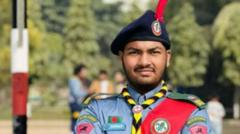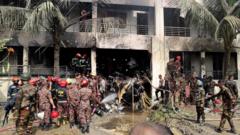A special court in Bangladesh has issued an arrest warrant against former Prime Minister Sheikh Hasina, accusing her of involvement in the deaths of over a thousand protesters during her last months in power. The charges, deemed severe, come amidst political tensions and calls for timely elections from opposition parties.
Bangladesh's Former Prime Minister Faces Serious Charges Amid Political Turmoil

Bangladesh's Former Prime Minister Faces Serious Charges Amid Political Turmoil
Sheikh Hasina, Bangladesh's ousted leader, is now facing an arrest warrant related to the violent suppression of protests that led to numerous fatalities.
A special court in Bangladesh has issued an arrest warrant for former Prime Minister Sheikh Hasina, as prosecutors aim to hold her accountable for the deaths of over a thousand protesters during the waning days of her authoritarian regime. The International Crimes Tribunal, established by Hasina herself in 2010 to investigate historical war crimes, has charged her and several senior aides with a series of offenses, including incitement, facilitation, and conspiracy related to the mass killings.
The tribunal's chief prosecutor, Mohammad Tajul Islam, accused Hasina of orchestrating systematic violence against peaceful demonstrators last July before she fled the country and sought refuge in India, where she continues to reside. While Hasina has previously faced various arrest warrants, the current allegations represent the most serious indictment against her to date.
Hasina’s years of suppressing dissent have been well-documented, culminating in last summer's violent crackdown. The ongoing trial arrives amid a politically charged atmosphere in Bangladesh, as the interim government that supplanted her is criticized by opposition parties for postponing the elections intended to replace her. Muhammad Yunus, the 84-year-old Nobel Laureate leading the interim administration, is under pressure to conduct elections by December, though he advocates for a timeline that extends beyond that to facilitate necessary electoral reforms.
For the first time in Bangladesh’s history, the court’s proceedings were broadcast live, but all accused individuals, including Hasina, were absent from the hearings. The case reflects deep-rooted political struggles within the country, as the quest for justice intersects with the demand for democratic practices.



















